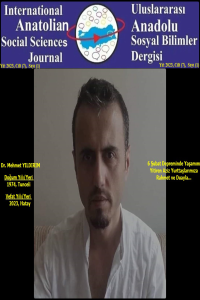EVALUATION OF CONSUMERS' PURCHASE AND FOOD EXPENDITURE HABITS IN THE MONTH OF RAMADAN: A FIELD RESEARCH IN NİĞDE AND ITS REGION
Öz
The research was carried out for the evaluation of Ramadan expenditures along with the purchasing costs, and food expenditure habits during the month of Ramadan. It is crucial that the study reveals the changes in consumers’ behavior during Ramadan and contributes to the literature. The data were obtained from the surveys conducted with a total of 338 fasting households in Niğde and its region from April 1 to April 30, 2022. The research carried out is an operational one and it aims to determine the current situation of the study by focusing on the case study. To carry out this study, the preferred scanning method, one of the research methods, is used without conducting any hypothesis or modeling method. In order to determine the point of view, expectation thought levels, and perceptions some descriptive statistics and Likert-type evaluation were used in the analysis of the data. The Cronbach's Alpha sensor coefficient for the entire scale was found to be .760. In accordance with the literature, the result of the research reveals that there is a perception that there are assets over the consumption and expenditures of food products at the end of Ramadan, that there is an increase in food consumption during the month of Ramadan, and that there is a perception that prices increase during the month of Ramadan. Finally, as a result of the research, it was determined that the most clothing-apparel-clothing expenditures, souvenir product expenditures, and bakery products (pita and tahini) expenditures of the participants increased during the month of Ramadan.
Anahtar Kelimeler
Proje Numarası
YOK
Kaynakça
- Aktaş, E. ve Yılmaz, İ. (2012). Mersin’de Ramazan ayının gıda tüketim harcamaları üzerine etkisi. Uludağ Üniversitesi İktisadi ve İdari Bilimler Fakültesi Dergisi, 31(2), 177-194.
- Akçadağ, Mualla, (2017). Yılın özelliği olan günlerinde seçili ürünlerin satış tutarlarındaki değişimin pazarlama sistemi üzerindeki etkisi üzerine bir araştırma, Nevşehir Üniversitesi, Sosyal Bilimler Enstitüsü, İşletme Anabilim Dalı, Üretim Yönetimi ve Pazarlama Bilim Dalı, Yayınlanmamış Doktora Tezi, Haziran 2017.
- Akmal, M. ve Abbasi, M. U. (2010) Ramadan effect on price movements:Evidence from Pakistan. State Bank of Pakistan Working Paper Series, No:32, I.I. Chundrigar Road, Karachi, Pakistan. http://www.sbp.org.pk/publications/wpapers/2010/wp32.pdf Erişim: 15.05.2022.
- Ayvaz, İ. ve Elmastaş, D. (2020). Fiyat indirimlerinin tüketici davranışları üzerindeki etkisinde algılanan kurumsal itibarın rolü. Avrasya Sosyal ve Ekonomi Araştırmaları Dergisi, 7(1), 86-95.
- Canpolat, N. ve Özkısaç, A. (2016). Pazarlama aracı olarak reklam: ramazan ayı gazete reklamları üzerine bir inceleme. Journal of International Social Research, 9(43), 1758-1765.
- Cennet, S. M. ve Çondur, F. (2021). Makroekonomik göstergeler ve tüketici davranışları. Aydın İktisat Fakültesi Dergisi, 6(1), 52-67.
RAMAZAN AYINDA TÜKETİCİLERİN SATIN ALMA VE GIDA HARCAMALARI ALIŞKANLIKLARININ DEĞERLENDİRİLMESİ: NİĞDE VE YÖRESİNDE BİR ALAN ARAŞTIRMASI
Öz
Araştırma, Ramazan ayı süresince tüketicilerin satın alma davranışları ile gıda harcamaları alışkanlıklarının değerlendirilmesine yönelik olarak gerçekleştirilmiştir. Çalışma, Ramazan ayının tüketici davranışlarında yaşanan değişikliklerin ortaya konulması ve literatüre katkı sağlaması bakımından önemlidir. Veriler 01-30 Nisan 2022 tarihleri arasında, Niğde ve yöresindeki genellikle oruç tutan toplam 338 tüketiciyle yapılan anketlerden elde edilen bilgiler doğrultusunda elde edilmiştir. Gerçekleştirilen araştırma, keşifsel bir araştırma olup, çalışma mevcut durumu belirlemeye yönelik durum tespiti yapmak amacındadır. Araştırma yöntemlerinden tarama yöntemi tercih edilen çalışmada, hipotez ya da model kurma tercih edilmemiş olup, verilerin analizinde, bakış açısı, beklenti, düşünce düzeyleri ile algıları belirlemede bazı tanımlayıcı istatistikler ile Likert tipi derecelendirme teknikleri kullanılmıştır. Ölçeğin tamamına ilişkin Cronbach’s Alpha güvenilirlik katsayısı .760 olarak bulunmuştur. Literatürle uyumlu olarak araştırma sonucunda, Ramazan ayının tüketicilerin gıda ürünleri tüketimi ve harcamaları üzerinde etkisinin bulunduğu, Ramazan ayının gıda tüketim harcamalarını arttırdığı ve tüketicilerin Ramazan ayı boyunca fiyatların yükseldiğini gösterir bir algılarının varlığını ifade etmekte olduğu ortaya çıkmıştır. Ek olarak yine araştırma sonucunda, katılımcıların Ramazan ayı süresince en fazla Giyim-Konfeksiyon-Kıyafet harcamaları, hediyelik eşya ürün harcamaları ile unlu mamuller (pide, tahinli) ürünlerinde harcamalarının yükselişe geçtiği saptanmıştır.
Anahtar Kelimeler
Destekleyen Kurum
Yok
Proje Numarası
YOK
Teşekkür
Sayın Editör, Yayınlanması için gönderdiğim makale için siz ve hakemlerin yapacağı tüm emekler için şimdiden teşekkür ederim.
Kaynakça
- Aktaş, E. ve Yılmaz, İ. (2012). Mersin’de Ramazan ayının gıda tüketim harcamaları üzerine etkisi. Uludağ Üniversitesi İktisadi ve İdari Bilimler Fakültesi Dergisi, 31(2), 177-194.
- Akçadağ, Mualla, (2017). Yılın özelliği olan günlerinde seçili ürünlerin satış tutarlarındaki değişimin pazarlama sistemi üzerindeki etkisi üzerine bir araştırma, Nevşehir Üniversitesi, Sosyal Bilimler Enstitüsü, İşletme Anabilim Dalı, Üretim Yönetimi ve Pazarlama Bilim Dalı, Yayınlanmamış Doktora Tezi, Haziran 2017.
- Akmal, M. ve Abbasi, M. U. (2010) Ramadan effect on price movements:Evidence from Pakistan. State Bank of Pakistan Working Paper Series, No:32, I.I. Chundrigar Road, Karachi, Pakistan. http://www.sbp.org.pk/publications/wpapers/2010/wp32.pdf Erişim: 15.05.2022.
- Ayvaz, İ. ve Elmastaş, D. (2020). Fiyat indirimlerinin tüketici davranışları üzerindeki etkisinde algılanan kurumsal itibarın rolü. Avrasya Sosyal ve Ekonomi Araştırmaları Dergisi, 7(1), 86-95.
- Canpolat, N. ve Özkısaç, A. (2016). Pazarlama aracı olarak reklam: ramazan ayı gazete reklamları üzerine bir inceleme. Journal of International Social Research, 9(43), 1758-1765.
- Cennet, S. M. ve Çondur, F. (2021). Makroekonomik göstergeler ve tüketici davranışları. Aydın İktisat Fakültesi Dergisi, 6(1), 52-67.
Ayrıntılar
| Birincil Dil | Türkçe |
|---|---|
| Bölüm | Makaleler |
| Yazarlar | |
| Proje Numarası | YOK |
| Yayımlanma Tarihi | 25 Mart 2023 |
| Gönderilme Tarihi | 23 Ocak 2023 |
| Yayımlandığı Sayı | Yıl 2023 Cilt: 7 Sayı: 1 |
Our journal licensed under a Creative Commons Attribution-NonCommercial 4.0 International License

